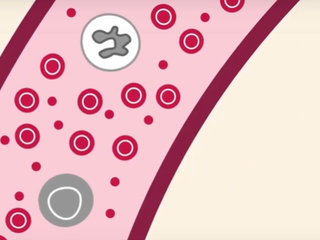What is APL?
Acute promyelocytic leukaemia (APL) is a type of leukaemia (blood cancer). It is a subtype of acute myeloid leukaemia (AML).
APL explained
APL is rare. Each year, around 160 people are diagnosed with it in the UK.
If you have APL, then some of your white blood cells don’t develop properly. Instead of growing into fully functioning white blood cells, which are part of your immune system, they get stuck at an earlier stage of development. These cells are called promyelocytes. They build up in the blood and the bone marrow (a spongy tissue inside some of your bones, where the body makes blood cells), leaving less room for healthy blood cells to grow and work.
This means your body doesn’t have enough white blood cells to fight infection, red blood cells to carry oxygen, or platelets to stop bleeding.
APL develops quickly (it’s acute), but most people will respond well to treatment and will go into remission.
We have more information explaining how blood cells normally develop and how blood cancer starts.
You can read more about APL in our booklet Acute promyelocytic leukaemia (APL).
APL and your genes
APL happens when something goes wrong with the genes inside developing blood cells. Genes are what tell a cell what to do and when. Genes are arranged in structures called chromosomes inside cells. In APL, two chromosomes get mixed up, and a gene from each chromosome join together to form a new, faulty gene called PML/RARA. It is this faulty gene which causes the blood cells to not develop properly, causing APL.
Most people with APL (around 95%) have the PML/RARA gene in their leukaemia cells, so if doctors can spot it with tests, this can help them to diagnose APL.
Even though APL is caused by a fault in a gene, these faults are things that happen during your lifetime. The fault are only present in the leukaemia cells. They are not faults you were born with, and you cannot pass the gene on to children.
Causes of APL
We don’t know exactly what causes APL, but there are some things that affect how likely you are to develop it.
Age
APL affects adults more often than children, and is most common in people aged 30 and over. There are no big differences in the way it’s treated in adults and children.
Previous treatment for cancer
Some people develop APL after chemotherapy or radiotherapy for another condition – most commonly for breast cancer. This type of APL is called therapy-related APL (tAPL), and it’s most likely to develop in the first five years after treatment.
APL is not caused by lifestyle factors such as what you eat and drink, how active you are, and whether you smoke. Your APL is not caused by anything you have done.

What is blood cancer?
Find out how blood cancer starts and how it can affect your body and your life.
